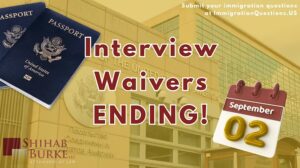It is an exciting time for many foreign nationals living in the United States. During the last four months, the EB-2 priority dates for India and China have moved forward over two years. As a result, many employment-based immigrants have been able to file Applications for Adjustment of Status earlier than they ever expected. At times such as this, many forget about the possibility of Visa Bulletin Retrogression, the “rolling back” of priority dates.
Visa Bulletin Retrogression is of particular concern for foreign nationals that are intending to or already are married. Spousal concerns can prevent or delay the filing of Adjustments of Status Applications.
The Department of State has recently indicated that Visa Bulletin Retrogression is likely to occur soon, therefore let’s discuss two common issues that face employment-based Adjustment of Status Applicants with regards to their families.
Delaying Adjustment of Status Due to Impending Marriage
United States immigration law permits only pre-existing spouses to immigrate to the United States with the principal employment-based immigrant. That is, a couple must be married before the employment-based immigrant receives their green card. Thus, intending employment-based immigrants sometimes delay filing for Adjustment of Status until after they are married so that their new spouse can immigrate to the United States with them.
Visa Bulletin Retrogression can delay the filing of Adjustment of Status in such cases. If, the Visa Bulletin retrogresses before the marriage occurs, the couple will not be able to Adjust Status until the priority date is current again.
For most foreign nationals, the risk of retrogression is worth it. If one marries after they get their green card, they can only bring a spouse to the United States by filing an I-130 Family-Based Immigrant Petition. This process can take years.
Failing to File Due to a Family Member Living Abroad
Sometimes spouses of employment-based immigrants are unable to apply for Adjustment of Status due to extended trips outside of the United States. Where retrogression occurs before the spouse can return to the United States and file an Adjustment of Status, the spouse could have trouble re-entering the United States.
A spouse abroad can obtain an immigrant visa to enter the United States by “following to join” the principal employment-based immigrant in the United States, that is, applying for an immigrant visa at a consulate. This process can, though, take some time. If retrogression occurs and the principal immigrant’s priority date is no longer current, a consulate won’t be able to issue an immigrant visa. The spouse abroad will have to wait until the priority date is current again.
There Are Options
The inability of a spouse to obtain an immigrant visa can sometimes be circumvented by entering the United States as a non-immigrant, either in a derivative capacity (H-4, L-2, etc.) or in their own right (F-1, H-1B, L-1, etc.), but such cannot be guaranteed. If the principal immigrant located in the United States cannot maintain their non-immigrant status, no derivative status will be available to the spouse abroad.
Further, if the visa bulletin retrogresses after the principal immigrant in the United States receives his or her green card (rather than while the application is still pending), obtaining a nonimmigrant visa for a spouse abroad could be more difficult; consulates will be reluctant to issue some types of non-immigrant visas to those with permanent-resident spouses.
Thus, if retrogression occurs and a spouse abroad cannot obtain a nonimmigrant visa, they will be stranded outside of the United States until the principal immigrant’s priority date becomes current again. This scenario, while somewhat unlikely and rare, has occurred in the past. If there is a possibility that such might happen with you or a family member, it would be wise to consult with an immigration attorney.
Conclusion
Family issues can complicate the Adjustment of Status process in many ways. Any decisions regarding these issues must be informed ones as to protect and preserve family eligibility for immigration benefits. As such, we at Shihab Burke LLC Immigration Lawyers are always happy to provide consultation on such issues.
Shihab Burke LLC Immigration Lawyers Can Help
If you are an immigrant with any questions or concerns regarding your denied immigration petition, visas, green card applications, or any other legal matter, speak at once to an experienced Columbus immigration attorney. A good immigration lawyer can help you and your family with any immigration issue you face and defend you if you’re accused of violating immigration law.
Our immigration attorneys will review your forms and applications for thoroughness and accuracy. Immigration laws will continually change, but an experienced immigration attorney will always be able to give you the most up-to-date legal advice you need.
We have offices in Dublin and Columbus, Ohio, Michigan, and Texas. But our full suite of immigration law services is available to clients nationwide and even around the world.
Contact us today!









